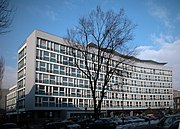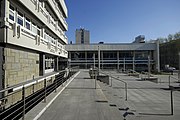Wojciech Buliński
Wojciech Włodzimierz Buliński | |
|---|---|
 Buliński in 2018 | |
| Born | 13 November 1929 |
| Died | 24 November 2021 (aged 92) |
| Occupation | Architect |
Wojciech Włodzimierz Buliński (13 November 1929 - 24 November 2021) was a Polish architect and professor who was dean of the Faculty of Architecture at Tadeusz Kościuszko University of Technology from 1987 to 1993.[1] He is noted as among the first architects in Poland to begin designing in the modernist style after the 'thaw' and decline of socialist realism which followed the death of Joseph Stalin and Bolesław Bierut.[2]
Buliński designed the Biprocemwap office building in Kraków from 1958 to 1960, with it being completed in 1963.[3] It is described as heavily influenced by the work of Le Corbusier,[3][4] and seen as the closest embodiment of Corbusier's themes in the modernist architecture being produced in Poland at the time.[5]
From 1971 to 1972, Buliński designed the Centre of Preventative Medicine with Ludwik Konior. Construction on the building was finished in 1974, but it was left unused for several years.[6] He also designed the building of the Faculty of Materials Science and Ceramics at the AGH University of Science and Technology.[7]
In 2001, Buliński was awarded the Officer's Cross of the Order of Polonia Restituta.[8] In 2013, he was a recipient of the Housing Environment 'Bene Merentibus' Medal for "outstanding merits in shaping urban architectural spaces and many years' teaching and scientific activities in Poland and on the international arena".[9]
Gallery
[edit]References
[edit]- ^ "prof. zw. dr hab. inż. arch. Wojciech Buliński - 13.11.1929 – 24.11.2021". Tadeusz Kościuszko University of Technology (in Polish). Retrieved 25 June 2022.
- ^ Jan Wrana (11 June 2009). "Cracovian modernists – the 60 ties, 90 ties of the XX century – the returns". core.ac.uk. Retrieved 25 June 2022.
- ^ a b Wojciech Niebrzydowski (2015). "Brutalism in Poland on the Example of the Architecture of Krakow". Journal of Sustainable Architecture and Civil Engineering. 10 (1): 40–49. Retrieved 25 June 2022.
- ^ "'Biprocemwap' (Office Building of the Construction Industry)". Architectural Map of Kraków. Retrieved 25 June 2022.
- ^ "Cracow and its architecture 1945-1990" (PDF). Jagiellonian University. Retrieved 25 June 2022.
- ^ "Centrum Zdrowia Budowlanych (obecnie Centrum Medycyny Profilaktycznej)". Szlak Modernizm (in Polish). Retrieved 4 July 2022.
- ^ "Międzyresortowy Instytut Technologii Materiałów Budowlanych i Ceramiki AGH (obecnie Wydział Inżynierii Materiałowej i Ceramiki AGH)". Szlak Modernizm. Archived from the original on 26 May 2022. Retrieved 4 July 2022.
- ^ "POSTANOWIENIE PREZYDENTA RZECZYPOSPOLITEJ POLSKIEJ z dnia 6 kwietnia 2001 r. o nadaniu orderów". Wolters Kluwer. 6 April 2001. Retrieved 25 June 2022.
- ^ Wacław Seruga (2015). "Czwarte zakopiańskie spotkania naukowe 2013 / Fourth Scientific Meeting Zakopane 2013". Środowisko Mieszkaniowe / Housing Environment (15): 14–26. ProQuest 2520830567. Retrieved 25 June 2022.



